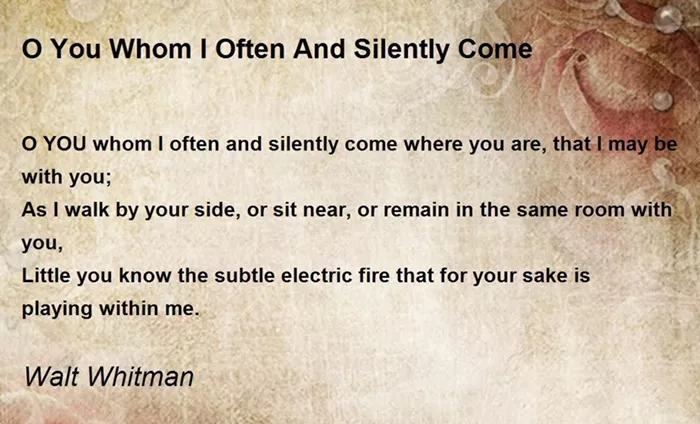Welcome to Poem of the Day – O You Whom I Often and Silently Come by Walt Whitman.
Walt Whitman, the great American poet, is known for his expansive and deeply emotional verse, and one of his lesser-known but highly evocative poems, “O You Whom I Often and Silently Come,” beautifully exemplifies his unique approach to human connection, love, and transcendence. In this article, we will delve into the meaning of the poem and explore how Whitman’s language illuminates his views on love, the sacred, and the eternal bond between individuals.
O You Whom I Often and Silently Come Poem
O YOU whom I often and silently come where you are, that I may be
with you;
As I walk by your side, or sit near, or remain in the same room with
you,
Little you know the subtle electric fire that for your sake is
playing within me.
O You Whom I Often and Silently Come Explanation
Understanding the Poem
At first glance, “O You Whom I Often and Silently Come” may appear simple in its structure, but Whitman’s choice of words carries a depth that invites the reader into a sacred, intimate space. The poem’s tone is reflective, almost confessional, as the speaker addresses an unnamed person, perhaps a lover, a muse, or even the concept of a spiritual presence. Whitman’s signature style of blending the personal with the universal shines through, offering both intimacy and transcendence in the same breath.
The title itself establishes a strong sense of quiet yet intense devotion. The speaker’s visits are frequent, yet unspoken—”silently come”—suggesting an emotional or spiritual connection that does not necessarily require words, but is nonetheless deeply felt. This idea of silent communication or unacknowledged presence is central to understanding the poem.
The Language of the Poem
The poem opens with an invitation to the subject, “O You,” directly addressing the other. This impersonal “You” might seem distant at first, but as the poem develops, it becomes clear that this “You” represents a deeply personal connection. Whitman’s use of “often” suggests that the speaker’s relationship with this person or force is ongoing, established over time, yet also distant in terms of physical interaction.
The phrase “silently come” carries an emotional weight. Silence, in Whitman’s world, can be a profound act of communion. He often explores how deep connections need not always be expressed vocally but can be understood on a deeper, perhaps more spiritual level. Here, silence becomes a form of intimacy, a quiet presence that speaks volumes without uttering a single word.
Exploring Themes of Intimacy and Spirituality
One of the key themes in this poem is the connection between the human and the divine. The speaker might be addressing a lover, but this connection is framed in such a way that it could also be an exploration of the speaker’s relationship with the divine or the eternal. Whitman often blurred the lines between the personal and the universal, and in this poem, that blurring creates an image of a connection that transcends time and place.
The quiet nature of the speaker’s coming represents a form of devotion or reverence that is not based on outward gestures but on an internal, spiritual commitment. Whitman often celebrated the sacred in everyday life, and here, the silent return could be seen as a representation of a daily spiritual ritual—something repeated often, quietly, with deep respect and understanding.
Imagery and Symbolism
The imagery in this poem is subtle but rich with meaning. Whitman’s use of “come” can symbolize more than a physical arrival; it represents the act of returning, of returning to something that feels eternal. There is an implied cyclical nature in the “often”—the idea of coming back, repeatedly, to a source of comfort, love, or understanding.
The simplicity of the poem’s language makes these images even more powerful. The repeated, almost meditative act of coming and going signifies an ongoing journey, one that does not necessarily need to be expressed outwardly but is fully known within the heart and mind.
Whitman’s Unique Voice and Philosophy
In typical Whitman fashion, the poem carries a sense of optimism and boundless love. While the poem speaks of quiet presence, it does not imply distance or detachment but rather an embracing of a connection that is all-encompassing and eternal. Whitman often sought to break free from the traditional confines of formal poetry, and in this poem, we see his trademark free verse style, which mirrors the freedom and openness of the emotions he describes.
His voice is direct and unadorned, focusing on the simplicity of the connection between the speaker and the subject. This is not a poem of dramatic gestures or heavy metaphors but rather one of quiet intimacy, grounded in the everyday moments of connection that accumulate over time.
Conclusion
In “O You Whom I Often and Silently Come,” Walt Whitman explores themes of love, spirituality, and the silent yet profound nature of human connections. The speaker’s devotion is expressed not through loud declarations but through the quiet, recurring act of returning. This poem is a testament to Whitman’s belief in the eternal bond between individuals, one that transcends time, place, and words. It highlights how deep affection and spiritual communion can be experienced in the simplest, most silent ways, yet be filled with profound meaning.
Whitman’s ability to communicate complex emotions through simple yet powerful language allows us to reflect on our own connections—whether with a person, nature, or the divine—and realize that even in silence, there is great depth and understanding.

